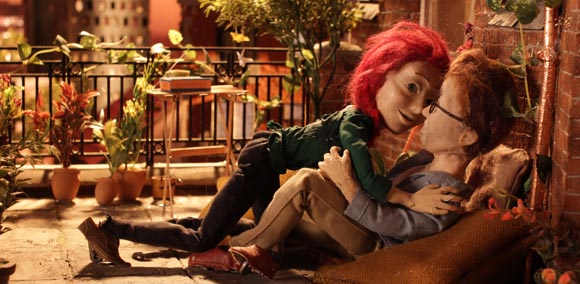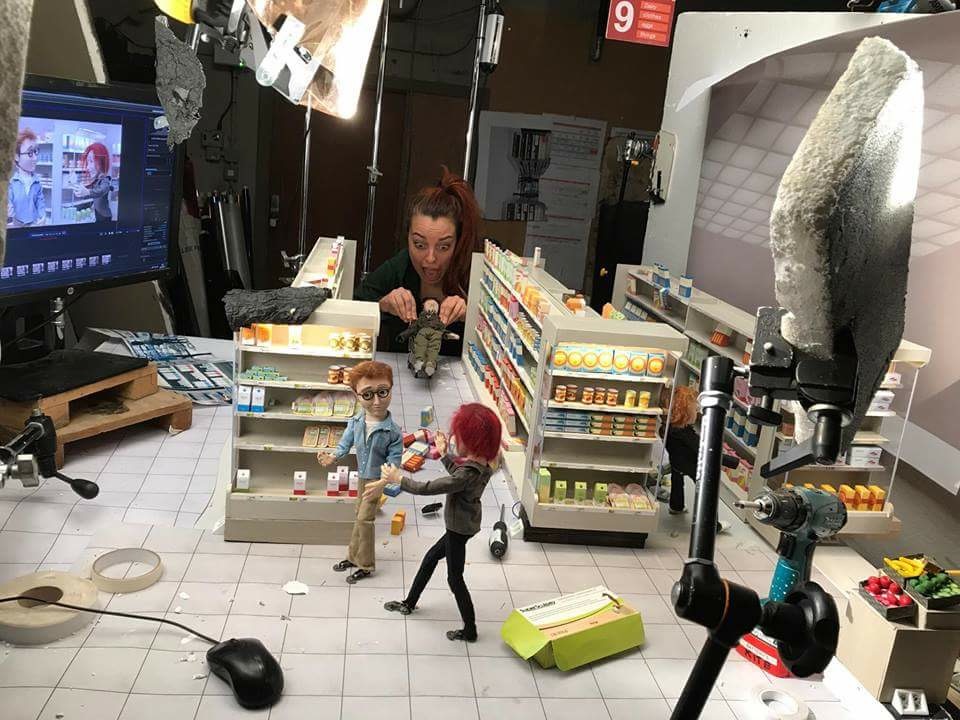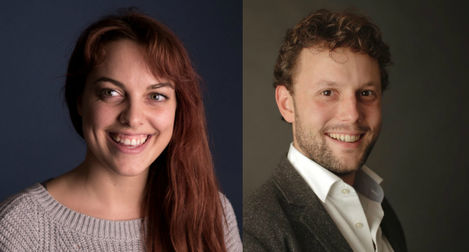Lucia Bulgheroni and Lennard Ortmann
We spoke to the director and producer, who graduated from NFTS with their stop-motion animation short Inanimate, which was selected by Cinéfondation at Cannes 2018.
What’s your connection to the British Council?
Lucia Bulgheroni: I hope to start a connection with the British Council, expanding my network within the film industry and introducing my creative contribution to the world!
Lennard Ortmann: We have recently learned about the British Council’s Short Film Travel Grants scheme for which we have two applications running. This is a brilliant scheme that can make the difference between a short filmmaker being able to go to a festival with their film or having to stay at home. Its a well-known fact that there is no money in short film, but it's still the way many filmmakers enter the industry. So any help that enables young talent to promote their work is extremely valuable.
What are you working on right now?
LB: At the moment I'm experimenting with new animation techniques, researching and feeding my creativity and mind.
LO: I recently tutored on the BFI Talent Academy, working with young filmmakers from across the UK to enable them to make their films. Teaching was a new experience for me but I thoroughly enjoyed it. Since then I have been producing three shorts which are being made as part of The Diverse Directors’ Workshop, which champions directing talent from a range of backgrounds.
What originally turned you on to film?
LB: I started to love cinema during my high school years. I was a proper nerd, watching lots of films (classics mainly) after school with my friends, dreaming of making our own films one day. I re-discovered animation during university (even though I grew up with the old Walt Disney films that are deeply rooted in my subconscious). As soon as I tried animating a puppet and watching back the magic I had created, I got hooked. That's how I decided to apply for an MA in directing animation.
LO: I grew up without a TV and my parents weren’t that keen on the cinema. But I remember finding an old VHS camcorder in my best friend’s uncle’s attic and from then on we just messed about. We made our first shorts which, in retrospect, are of course hilarious and mostly terrible. We stuck with it though, and started to get better after bit by bit. Eventually we won some awards at local film festivals and that was it: we both stuck to that path. My friend is now studying to be a director in Cologne, Germany.
What has been your career high so far?
LB: My career is just starting. My graduation film Inanimate threw me straight into Cannes. So, right now I'm at my highest point.
LO: I’m with Lucia on this. Being invited to Cannes with our graduation film has been incredibly exciting.
What was your first job in the film industry?
LB: My graduation film! I'm just starting. I've worked in commercials and music videos in the past – now it's time to get into the real film industry!
LO: My first job was as an office runner in the development department of Zeitsprung Pictures in Cologne. It was a small department – one development executive and me – so I was soon given the opportunity to read scripts and do research, in addition to making cups of tea and getting lunches. I was there for six months – it was a great start in the industry.

Inanimate
What key piece of advice would you give to someone starting off in filmmaking?
LB: Just be spontaneous. Do not try to imitate anyone and don't do something because someone says that's the right way. Allow yourself to discover who you are – that's a beautiful, life-long research project!
LO: Just do. If I look back at some of the things I did a while ago I cringe and laugh a lot. But it's all part of growing. And remember that every failure is a step towards becoming better. There is luck too. If you hear people speak that have made it in the industry they always seem to have had a lucky break at some point. But I think that you play a huge part in making your own luck. Put yourself out there, meet people, keep going and eventually you’ll be in the right place with the right people. To be honest I still very much feel like I’m starting out myself!
What is your favourite British film?
LB: Today I would say Terry Gilliam's The Zero Theorem. Or any Kubrick film, but it's too easy to pick one of his film as a favourite! I loved, and still love, The Zero Theorem (more than Brazil). I think it pictures the struggle of existence and our society quite accurately, with its disturbing humour and brilliant grotesque style. It's clever philosophical cinema. It makes me think.
LO: I usually avoid this kind of question, but if you’re putting me on the spot, I’d say that one of my favourite recent British films is Ex Machina by Alex Garland. It's a perfect example of what I’d call a clever, thought-provoking, but still entertaining, science fiction film. It's not set too far into the future so it feels relevant to today, but there's a little bit of distance that allows us to examine its themes with clarity.
If you could have directed/been involved with any film ever made, which one would it be?
LB: Mother! I've never had such a strong reaction to a film. It just ripped my soul apart. It made me cry with desperate frustration and I kept thinking about it for weeks. It speaks in so many layers – you'll receive the message you're ready to receive.
LO: I would have loved to have been involved in the making of Lawrence of Arabia. Apart from the fact that it's an epic classic which I hugely admire, I think the production would have been quite an adventure.

On the set of Inanimate
What’s the first film you remember seeing?
LB: It was a Walt Disney film, probably Snow White or Sleeping Beauty, but I can't remember what I felt as a child. But I clearly remember the film that made me say, “So this is cinema, wow! That's amazing, I want to see more!" – it was Polanski's Rosemary's Baby. I remember being so emotionally engaged and thrilled. I was in my mid teens. That was the film that made my cinephillia start.
LO: Charlie Chaplin’s The Pilgrim was the first film I ever saw in the cinema. My dad took me when I was around six years old. I don’t remember too much about it, to be honest, just that my father was reading the title cards for me because I couldn’t keep up. I remember the excitement of the experience, though: the lights going down, the chatter dying, the music starting (which was being performed live on a piano next to the screen). And the final image of the pilgrim straddling the border between the US and Mexico has remained with me ever since.
What’s your favourite line from a film?
LB: The line that echoed in my brain and then shivered in my heart was when Chihiro says Haku's real name in Spirited Away: "Your real name is Kohaku." That whole scene is wonderful, so magical and full of pure love. I think that is my favourite film ever. It spreads love, beauty, astonishment and genuine feelings all over your body – it's the best!
LO: “I’m mad as hell and I’m not going to take this any more” from Network, because, every now and then, the world can be a bit much. I tend not to say it out loud though!
What's your favourite screen kiss?
LB: It's in V for Vendetta. It's so perfect and poetic. It's not just a kiss, she is kissing a political idea. It's very powerful.
LO: A bit of a cop-out but I want to say the kiss that never happens in Lost In Translation. For me, the relationship between Scarlett Johansson and Bill Murray is amongst the most interesting, tense and tender of all time.
Who’s your favourite screen hero or villain?
LB: Jack Sparrow, just from the first Pirates Of The Caribbean. I was quite obsessed with him as a teenager. He is in the middle. Not with the good, nor with the evil. He is a pirate, he is chaotic, he creates mess, he is dynamic, he follows what he wants. He is free.
Who would play you in the film about your life?
LB: It's sort of already happened with my graduation film. I have a puppet of myself, I animate her playing me.


